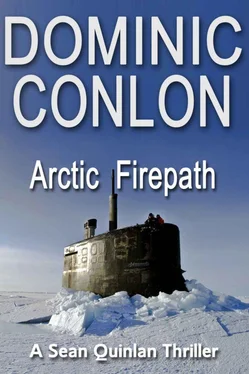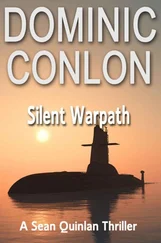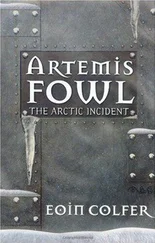This time he recovered less slowly, knowing that no matter how much training he had had, he could not survive another session.
'OK' he gasped after a full minute recovering. He lent over the side and vomited a yellow watery bile. 'I'm ready,' he said weakly.
The situation room in the basement of the West Wing was full. President Robert Donahue viewed the assembled staff; the vice President, joint chiefs and their advisers, and the national security team were all present. The Secretary of Defence Brindle Harris sat on his left, and CIA director Henry Alfred Jones on the right. Everyone had been briefed before the President rose to his feet.
'I spoke to Pavla Duskin thirty minutes ago. He flatly denies their icebreaker was implicated in the incident.' The President clicked a switch in front of him, and they listened as a recording of the conversation was replayed.
'I absolutely deny any Russian vessel was involved in the sinking of the USS Montana.' The Russian President spoke good English, but his voice was raised as if the American President's suggestion was outrageous.
Donahue's calm voice was in direct contrast to his opposite number. 'Mr Duskin, I have hard evidence from the Captain of the submarine, together with detailed digital data. This is proof which you cannot deny.'
'You have my sympathy for the plight of your men, but I will publicly denounce any suggestion Russia is involved.'
'Can I have your assurance you will do everything in your power to help rescue the crew? In particular, we wish to use the deck of LK-80 to position equipment to aid us in the recovery.'
There was a moment's silence before the Russian President replied. 'President Donahue, I cannot let you use our vessels to place your equipment.'
'Why not? May I remind you about the treaty both our governments signed back in 2011? We agreed to assist each other in the event of an emergency situation occurring in Arctic waters.'
'How can I loan you a ship, when you continue to detain Russian airmen? Surely that in itself is contrary to all international laws. I'm afraid this alone breeches any agreements we made in the past.'
'Are you refusing to help us? Over a hundred men's lives are now in danger. If you do not act, they will surely die.'
'President Donahue, please do not deliberately misunderstand me. I said no such thing. Of course we will help you. We are a compassionate country. We might find it difficult to forget, but we forgive easily. As a gesture of peace between our nations I will arrange for the rescue of the crew of your stricken submarine. But it will be organised and handled by Russian sailors on Russian vessels.'
The President leaned forward and switched off the recording. 'He wouldn't budge from that position' said Donahue bitterly.
'They don't have the right equipment for a rescue. And they won't be able to get to site in time.' Harris commented.
Brindle's deputy agreed. 'The Russians will play the waiting game, while proclaiming their offer of help to rescue the men in the submarine. Just look at the Kursk.'
Several heads around the long table nodded, but others appeared puzzled. 'It was a nuclear powered submarine like the Montana,' explained the Chief of Navy Operations. 'Two explosions occurred on board and it sank. The Russians failed to give enough urgency to a rescue, and kept tight secrecy over the event. The President was on holiday and didn't respond to repeated attempts to get him to intervene. All 118 officers and crew died. Later they found that 23 sailors survived the explosions, and could have been saved if the President had accepted foreign help earlier.'
For once, CIA chief Henry Jones found himself agreeing with Harris and his deputy. 'They will spin out their 'rescue'. By the time they are on site, the crew will be dead. The Russians will shrug their shoulders, but in the eyes of the rest of the world they will appear as heroes, beaten by an impossible deadline.'
'May I remind everyone that five men have already lost their lives,' remarked the President quietly. One hundred and twenty nine lives of our seamen are still at risk. I'm now going to give you a few minutes to confer.'
Several minutes passed in hushed consultation. At last Harris turned back to the President. 'We agree that we should continue to send help in the form of the SRDRS. But given the Russian intransigence, not all of us are agreed whether that should be accompanied by the military. In any case we need to create a landing strip on the ice, which will have to be lengthened to accommodate the heavier planes to carry the rescue equipment.'
'Henry?'
'Sir a military force is bound to aggravate the situation. Maybe we should think about using a commercial outfit. And what about the Vehicle of Opportunity? Perhaps we could find a plane large enough to accommodate a suitable size ship, and fly it out there.'
The President caught Harris shaking his head. 'This isn't feasible sir. We’re right up against the clock — every second counts. Our only option is to use the icebreaker as the VOO. San Diego checked the specs and confirms suitability for SRDRS.'
'Sir,' Jones interjected. 'This could provoke the Russians onto a war footing. We’re detaining Russian aircrew and unless my ears deceive me, Russia has offered to rescue our submarine crew. The sight of an armed unit at the North Pole might trigger major hostilities between our two nations.'
Brindle Harris leaned forward. 'There is a larger issue here — our inability to easily project a force in the Arctic. We are not nearly as well-equipped as the Russians. The only military hardware that can operate successfully in the conditions up there are aircraft and submarines. There are hardly any sea going vessels capable of dealing with the ice pack. We couldn't send a carrier group to the Arctic, let alone a few warships. The whole strategy needs to be thought out — but not today. Today American lives are at stake, and every minute we argue we lose time.'
The President considered those present; many were nodding in agreement. 'Very well gentlemen. We will send a military force to accompany the SRDRS to the Arctic. I would prefer we kept the mission low key — no camouflage, just polar whites. We also agree for the establishment of an airfield on the ice.'
'And the idea of using LK-80 for the rescue?'
The President turned to Harris. 'I thought I just answered that question.'
* * *
The bar was full of people, stopping off for a coffee or beer on their way home from work. Khostov waited impatiently for his contact to show. He was sitting at the back of the room, sipping an espresso when he spotted a small man with dark hair coming towards him.
'You're an hour late!'
The contact appeared unconcerned and took a chair. 'I came when I could — I told you it would take longer to get — ' he glanced around to ensure no-one could overhear. 'Your document.'
'Have you got it?' Khostov struggled to keep the tension out of his voice.
'Maybe,' he replied with a non-committal shrug of the shoulders.
'What do you mean — maybe?' asked an exasperated Khostov. 'Either you have it, or you don't have it!'
'The man considered Khostov. 'It cost more than I thought.'
'How much more?' Khostov asked uneasily, all too aware that Yakov's money was fast disappearing.
'Five thousand euros.'
Khostov calculated this would just about finish the remainder of his money. He was appalled that despite the large amount of cash he had started with, it had disappeared so quickly. He reminded himself it was only a means to an end.
'Two thousand euros, no more.'
The Frenchman shook his head. 'No monsieur. I will accept four thousand, no less.' He made as if to get up from the table.
Читать дальше












